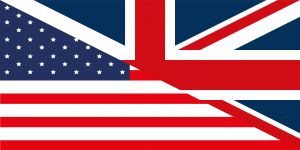In the IELTS writing exam it is perfectly acceptable to use American spelling. However you must be consistent throughout. In other words don’t mix American and British spelling. It’s very easy to do this so during your writing practice decide which form you are going to use and learn the main differences.
Here are some of the main ones you must know:
-er/re
Words that end in –re in Britain often have those two letters reversed in American English.
British English
centre, fibre, litre, theatre
American English
center, fiber, liter, theater
-nse/nce
While the British use the –nce ending, Americans generally prefer –nse.
American English
defense, license, offense, pretense
British English
defence, licence, offence, pretence
-ize/ise
American English uses the –ize spelling at the end of words, and while some people in Britain accept that as a valid spelling, you’ll usually see those same words spelled with the –ise ending instead.
British English
apologise, organise, recognise
American English
apologize, organize, recognize
-or/-our
In British English, the preferred spelling of words ending in –our is not maintained in American English; in the United States, the “u” is dropped from the word.
American English
behavior, color, humor, labor, neighbor, flavor
British English
behaviour, colour, humour, labour, neighbour, flavour
Double vowels “ae” and “oe”
While the British retain the more complex spelling of words with Greek or Latin roots, using the orthodox spelling that was established when those words were brought into the English language as far back as the 14th and 15th centuries, the Americans, as usual, like their terminology simplified.
American English
leukemia
maneuver
estrogen
pediatric
British English
leukaemia
manoeuvre
oestrogen
paediatric
Words ending in a vowel plus –l
While Americans have dropped the double “l” when adding suffixes to verbs that end in the letter “l” the British still generally use the two-“l” approach to their spelling.
American English
traveling
traveled
traveler
fueled
fueling
British English
travelling
travelled
traveller
fuelled
fuelling
Thanks to spreeder.com

Recent Comments